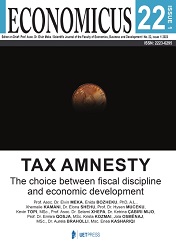Tax Amnesty – The choice between fiscal discipline and economic development. The case of Albania
Tax Amnesty – The choice between fiscal discipline and economic development. The case of Albania
Author(s): Xhemalie Kamani, Elona Shehu, Hysen MucekuSubject(s): National Economy, Economic policy, Economic development, Fiscal Politics / Budgeting
Published by: Shtëpia botuese “UET Press”
Keywords: economic development; taxes; avoiding paying taxes; tax amnesty; reimbursement; state budget; cost; benefits;
Summary/Abstract: Nowadays, the various problems in the economy are directly affecting the economic development of the countries considering tax abuse as a serious issue in the economy, in overall. The conflict arising in nowadays society seems to be between the demand to increase welfare and consequently the refusal to face tax obligations. Hence, a country’s economy cannot upgrade itself without the efficiency of fiscal policies. The scope of this article is to analyze the relationship between fiscal discipline and economic development in Albania. The objectives of this research are to review the literature on tax amnesty program and describe the factors related to tax amnesty, such as: implementations, costs and benefits, participation and the effects of the program and lessons learned from countries around the world to show the connection that exists between tax amnesty and economic development in Albania. For all possible standards in the country, it is very important that the state budget is reimbursed in a timely manner. Undoubtedly, the question that arises on behalf of this paper is whether the tax amnesty would serve as an aid for the reimbursement of the state budget.
Journal: ECONOMICUS
- Issue Year: 22/2023
- Issue No: 1
- Page Range: 30-42
- Page Count: 13
- Language: English

